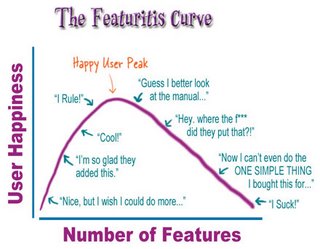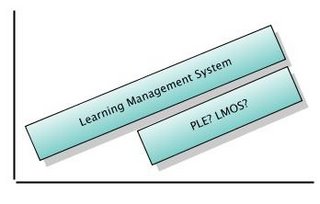On Creating Passionate Users they had a great picture that captures how many of us feel about LMS products:
 As the number of features increases our satisfaction level begins to go down because of the complexity of getting it to work for us.
As the number of features increases our satisfaction level begins to go down because of the complexity of getting it to work for us.
What often happens when systems become very complex is that they begin to get replaced by simpler systems. This is exactly what's happened in the Content Management space. Wiki's have exploded onto the scene. They only do about 10% of what a typical CMS will do for you. But, they are so dang easy to get going and use. So, they've supplanted the low-end of the market. It forces the CMS products to seek ever higher features to continue to differentiate - a vicious cycle. I believe we are poised to see this happen in the world of the Learning Management Systems (LMS). They are rapidly growing features that are far beyond what anyone needs. If you look at what's going on at Saba, SumTotal or any of the major players, they are adding features and major functional areas at an amazing pace. There are definitely some low-end LMS products that are easy to get up and going. But that's not really what's going to replace the LMS. They still require you to think and act in terms of "course" and "training" which is slowly becoming the wrong way to think.
I believe we are poised to see this happen in the world of the Learning Management Systems (LMS). They are rapidly growing features that are far beyond what anyone needs. If you look at what's going on at Saba, SumTotal or any of the major players, they are adding features and major functional areas at an amazing pace. There are definitely some low-end LMS products that are easy to get up and going. But that's not really what's going to replace the LMS. They still require you to think and act in terms of "course" and "training" which is slowly becoming the wrong way to think.

Of course, this raises the question - well if we don't really want an LMS, then what's the replacement?
Scott Bradley Wilson helped by providing a post with more detailed visualization of this.
I think that folks who are in the Personal Learning Environment (PLE) space have a much better idea of what will come next. In fact, many of us have all created our own Personal Learning Environment by cobbling together using a variety of tools (RSS Reader, Bookmarking, Social Networking, Desktop Search, Web Search, Personal Learning Blog, To Do Lists). I'm not 100% sure that we've quite got this right, but it's certainly much more meaningful to me as a learner than an LMS.
If you step back and take the perspective of a learner, an LMS is simply one of many content sources and there is no advantage to me as a learner of having to go through and register for the course (except that I won't get bugged about not completing the course). The tracking is not for me as a learner.
That's what makes me think that something more along the lines of a PLE will begin to come together to replace it.
However, I remain skeptical that we really understand how to use these tools to be better learners and thus, are a bit away from having well-formed personal learning environments. In fact, I believe this to be one of the bigger questions that we face as an community.
11 comments:
Scott - First, let me commend you on reading blogs - that puts you in the top 5% of people in your field. Second, great question - truly! I'd like to continue to get your input on this topic.
This is probably worth a full post, but let me start with a few thoughts.
1. In some cases it is mandatory to track training completion, e.g., compliance. This occurs often in certain industrys and content topics. If you are dealing with compliance, then *today* you still need the LMS. You mentioned "auditors" so I'm guessing compliance requirements.
2. In many cases internal clients say they need tracking, but its debatable. For example, rolling out a new product. They want to know who's gone through the training on the product. In all of these cases, if the LMS did a better job supporting the learner, it's a no-brainer to use the LMS, but the downside is that it's harder for learners to get to the content and makes the content mostly useless after training is completed. So, there's a trade-off between easy, on-going access and being able to track completion. The other part of the discussion is - What do you really care about? That they complete, or that they are able to do the work? I would say the gentle trend in corporate learning/performance is away from the LMS in these situations, but certainly it still happens a lot.
3. In the future - and likely some LMS products do this today - I just don't know them - we would expect that tracking will occur seamlessly. In other words, the user would be cookied and as they access content you keep track of this. We've done this already in many circumstances through customizing the LMS or by having a separate tracking mechanism - but it's painful enough that in most cases you are probably better off just forcing the user to use the LMS.
4. So the reality is - for now - that you don't replace the LMS with Web 2.0 technologies. Rather, you pick-and-choose when/where to use it. Once you open that up for discussion, then it becomes much more interesting to see what kind of solution results. Note: an LMS suggests a particular kind of solution.
---
By the way, I'm curious what the "mixed feelings about the LMS" are? I have my guess at what you mean, but I'm curious.
Scott - what do you think the security concern(s) will be?
I've not found this to be much different than security concerns around an LMS. There's a twist because of the ability of many people to be authors, but since that's tracked by the Wiki, generally this passes scrutiny.
Take a look at:
Firewalls and Security in Software as a Service
Which is a slightly different topic, but again, I'll be curious what your response is...
By the way Scott, is your blog something that is aimed at an internal corporate audience as much as an external audience. In looking at it, seems like it is. Makes it an interesting blog for me to point out to folks. Let me know if that's okay.
Which, of course, is a fascinating answer itself and indicative of one of the central concerns about these technologies. My sincere hope is that you would be able to continue to blog in public so that (a) you can be part of the dialog, and (b) so that you can continue learning. It's really as much of a self-directed learning tool as it is a communication tool.
Let me know how it ends up.
Dave - I agree with you that there's a role for course and that it's most often for relative newcomers. Once people know enough about a subject, their knowledge is so scatter that you have to looks for common holes in the knowledge for other "courses." But the vast majority of needed learning will not be common across a large enough audience, so you look to other mechanisms.
The issue of "feeding the elephant" is also a really good point. It is related to (but slightly different than) having a hammer and thus everything looks like it needs a whack. With an LMS, every learning need looks like a course.
Thanks for your great comments!
What about the concept of a Learning map. A guide so to speak of what you need to learn and where to find it.
That's a great point. The learning map is important and valuable - often it's obscured in an LMS. So maybe focusing on that instead would offer greater value proposition.
http://www.saba.com/news_events/press_releases/2008/news_2008_10_21_social.htm
Somehow this old post appeared in my Google Reader but I thought the post was thought provoking.
I'm President of LatitudeLearning, www.LatitudeLearning.com, an LMS vendor. I agree with you that LMS users want a simple, intuitive interface. However, to most people this translates into having an LMS that can adapt to their learning processes. Likewise the handful of functions that one community needs, is not necessarily the features another community needs.
That's why we've chosen to architect our LMS with embedded Content Management, Web Services, and Web 2.0 tools so each LMS portal can be easily adapted to a community's needs.
However, I also agree with you that our understanding as learning professionals on how to use the LMS toolset is evolving. I personally think it will take another decade for a learning management solution to evolve to maturity.
Tony, I seen your blog and like the idea of getting an impartial opinion on our current scenario. I'm in the process of implementing the Learn.com (LMS) (now Taleo) software and it's been an extremely painfaul process. I am the PM/ Analyst on the project and the more we peel back the layers on this onion, the more we find that the LMS we purchased does not do even the most basic LMS functions. My background, is 17 years in IT implementing many complex system and this one I think scares me the most, as we're seeing defects, changes to original agreements in the 11th hour and our team is very concerned that this product will not meet our communication and "messaging" needs and other critical needs such as tracking Assessment/ Course completion. We are considering pursuing other options; however I want to start viewing Blogs/Sites that show Customer Satisfaction with various Learning Management Systems. 1) First, are you familar with Learn.com (LMS) and do you know if customers are generally happy with this software? and 2) Second, do you know where I can go to see Company/ User evaluations of the various systems? Thank you.
1) First, are you familar with Learn.com (LMS) and do you know if customers are generally happy with this software?
I am familiar with Learn.com although it was a little while ago the last time I dove in deeply.
Like most LMS solutions reactions are mixed. I know a few very happy customers and some that have faced challenges with particular models that don't fit that well. In fairness, these models didn't fit well with any LMS.
2) Second, do you know where I can go to see Company/ User evaluations of the various systems?
The eLearning Guild used to do this research, but stopped a while ago. I posted:
http://elearningtech.blogspot.com/2007/09/lms-satisfaction-features-and-barriers.html
The last time I had access to that kind of information. I don't think user surveys are currently being done even though it should be.
Post a Comment